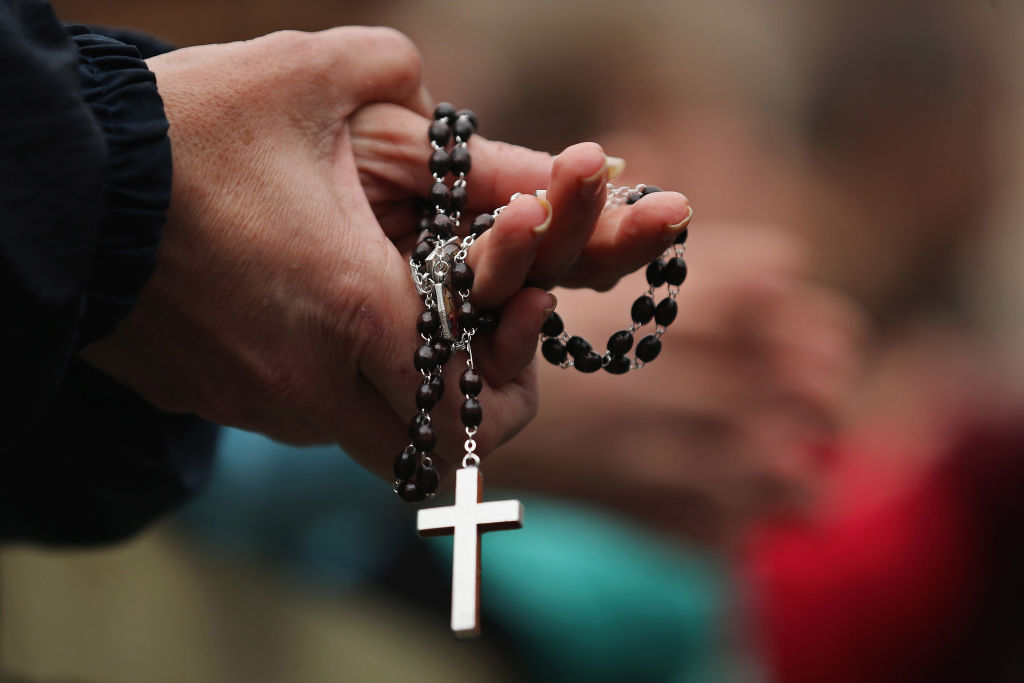Which of the zillion prophesied crises will engulf America next? At the moment, the most chattered-about is a “second civil war,” though some also worry that the United States could lapse more peacefully into autocracy. The left, of course, is consumed by fears of climate change drowning New York, while some on the nationalist right foresee a Camp of the Saints-style immigrant invasion overwhelming public services.
Yet amid all the wandering imaginations and doomsday scenarios, there’s one contingency that has absolutely zero chance of happening: America as a Christian theocracy. With all due respect to Sohrab Ahmari and the Handmaid LARPers, there are greater odds of Beto O’Rourke being appointed god-emperor than of any kind of merger between church and state.
Yet this hasn’t stopped some on the left from discovering another boogeyman under the bed. “Christian nationalism” is their new bête noire, and it means roughly what you would expect: that America is a Christian nation and that biblical morality ought to be, if not nationally enforced, then officially promulgated. “Republicans… are openly embracing Christian nationalism,” warned Meet the Press skipper Chuck Todd. “In a matter of months,” pronounced Molly Olmstead at Slate, “‘Christian nationalist’ transformed from being a taboo to cultural signifier,” a normalization she called “dangerous.”
In fairness, some elected Republicans have fed into this. “I’m a proud Christian nationalist,” tweeted Marjorie Taylor Greene, while her colleague Lauren Boebert declared that “the church is supposed to direct the government.” Among rank-and-file Republicans, meanwhile, a recent University of Maryland poll found that 61 percent favored “declaring the US a Christian nation,” compared to just 38 percent of Americans as a whole.
Yet contra the left’s hysterics over Christian nationalism, it’s worth considering what most Republicans actually mean by “Christian nation.” Take it from someone who’s been around these arguments for a while: it doesn’t mean Joel Osteen gets to run the Pentagon. It means rather that Christian teaching and virtue were a major influence on our founding and history — and that Christianity has often played a robust role in our public square.
Can anyone seriously deny that? Surely there was more to the framing than just Thomas Jefferson telling off the Danbury Baptists. Acknowledging as much, valuing that tradition, doesn’t mean you’re embracing some kind of theocratic takeover.
Also, if we’re going to quiver in fear over a national faith, I’m not sure it’s Christianity we need to worry about. Christians these days encounter headwinds when they try to thank Jesus at a graduation ceremony, let alone proselytize their beliefs from any position of power. It’s left-wing identity politics that’s presented as gospel truth in the classroom and the barracks now, not the actual gospels. In fact, it’s hard to think of a single elite institution not currently in the thrall of Ibram X. Kendi’s woke racialist gibberish.
Yet even beyond this, there’s another point to be made. Because the panic over Christian nationalism has obscured something very important that’s happening inside the GOP.
One of the most important trends of our time is that the United States is losing its religion at a rapid rate. It’s no longer the first-world exception to the secular tide: fewer than half of all Americans now say they belong to a house of worship. These so-called “nones” are the fastest growing demographic in the country. And while Generation Z is surprisingly conservative in many respects, they’re also the least churched cohort in history. The GOP remains the political party of believing Christians, yes, but it’s not like it hasn’t been affected by all this. According to Gallup, the share of Republicans who go to church has declined over the last decade from 75 percent to 65 percent. A majority of Republicans now support gay marriage and marijuana legalization, traditionally nonstarters for the religious right. And while Donald Trump energetically courted evangelical voters, neither he nor likely 2024 presidential candidate Ron DeSantis are anywhere near as openly religious as, say, George W. Bush was.
Republicans are secularizing too — just a bit slower than everyone else. And their latest champion, Donald “Two Corinthians” Trump, was hardly some harbinger of Christian nationalism — just the opposite. In his excellent book Alienated America, Tim Carney shows that the less a Republican voter went to church, the more likely he was to support Trump in the 2016 GOP primaries. Among those Republicans who said they never attended worship services at all, Trump walked away with 62 percent of the vote.
The point, as Carney stresses, is not that Trump was some cattle call for right-wing libertines. It’s that he was the candidate of those who have most proximately experienced the weakening of civic society, including the communal glue once provided by churches. This share of the Republican electorate is driven far more by alienation and frustration than any kind of Christian revivalism.
Trump, then, was both a reaction to the aftermath of secularism and a kind of negotiation with secularism itself. If the left were willing to study the right, they might have noticed this. Instead they’re sharpening their broomsticks against the coming Christian insurrection. The thinking seems to have gone like this: we don’t like Christians… we don’t like nationalists… so imagine if they got together!
The real story, for anyone willing to investigate it, is that those in both parties are broadly and decisively losing their faith, a seismic shift that could have implications that go well beyond politics. As for Christian nationalism, I’m afraid it’s on to the next doomsday scenario — a volcanic eruption, maybe?
This article was originally published in The Spectator’s November 2022 World edition.


















